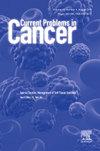侵袭性血管粘液瘤的激素治疗
IF 2.3
4区 医学
Q3 ONCOLOGY
引用次数: 0
摘要
目的本综述旨在评价激素治疗,包括促性腺激素释放激素激动剂(GnRH激动剂)、芳香化酶抑制剂(AIs)、选择性雌激素受体调节剂(SERMs)和联合治疗在侵袭性血管粘液瘤(AAM)治疗中的疗效。方法进行全面的文献检索,以确定报告使用激素干预治疗AAM的研究。对75篇科学论文进行了分析,以收集有关治疗方式、反应率和不良反应的数据,然后对这些数据进行提取和合成。审查是根据PICO(S/T)框架进行的,以确保数据综合和解释的一致性。本系统评价遵循系统评价和荟萃分析(PRISMA)指南的首选报告项目,以确保方法的透明度和严谨性。结果促性腺激素释放激素激动剂通过诱导低雌激素水平,使肿瘤缩小,防止肿瘤复发,具有抗肿瘤活性。芳香酶抑制剂稳定了疾病进展并改善了症状。术后给予选择性雌激素受体调节剂延长无进展生存期。联合治疗表现出协同效应,在新辅助和辅助设置中观察到显著的反应。结论雌激素受体(ER)和孕激素受体(PR)阳性是治疗AAM的有效辅助手段。虽然有效,但仔细监测不良反应和个性化治疗方法对于优化结果和最小化风险是必要的。这篇综述强调了激素干预在AAM多学科管理中的作用,强调了进一步研究以完善治疗策略和改善患者预后的必要性。本文章由计算机程序翻译,如有差异,请以英文原文为准。
Hormonal treatment of aggressive angiomyxoma
Purpose
This review aims to evaluate the efficacy of hormonal therapy, including gonadotropin-releasing hormone agonists (GnRH agonists), aromatase inhibitors (AIs), selective estrogen receptor modulators (SERMs) and combination therapy in the management of aggressive angiomyxoma (AAM).
Methods
A comprehensive literature search was conducted to identify studies reporting the use of hormonal interventions in AAM treatment. Seventy-five scientific papers were analyzed to gather data on treatment modalities, response rates, and adverse effects, which were then extracted and synthesized. The review was structured according to the PICO(S/T) framework to ensure consistency in data synthesis and interpretation. This systematic review adhered to the Preferred Reporting Items for Systematic Reviews and Meta-Analyses (PRISMA) guidelines to ensure methodological transparency and rigor.
Results
Gonadotropin-releasing hormone agonists demonstrated anti-tumoral activity by inducing hypoestrogenism, resulting in tumor shrinkage and prevention of recurrence. Aromatase inhibitors stabilized disease progression and improved symptoms. Selective estrogen receptor modulators administered postoperatively prolonged progression-free survival. Combination therapies exhibited synergistic effects, with notable responses observed in neoadjuvant and adjuvant settings.
Conclusions
Hormonal therapy presents an effective adjunct to surgical resection in AAM management, especially in cases demonstrating estrogen receptor (ER) and progesterone receptor (PR) positivity. While effective, careful monitoring for adverse effects and individualized treatment approaches are necessary to optimize outcomes and minimize risks. This review highlights the evolving role of hormonal interventions in the multidisciplinary management of AAM, emphasizing the need for further research to refine treatment strategies and improve patient outcomes.
求助全文
通过发布文献求助,成功后即可免费获取论文全文。
去求助
来源期刊

Current Problems in Cancer
医学-肿瘤学
CiteScore
5.10
自引率
0.00%
发文量
71
审稿时长
15 days
期刊介绍:
Current Problems in Cancer seeks to promote and disseminate innovative, transformative, and impactful data on patient-oriented cancer research and clinical care. Specifically, the journal''s scope is focused on reporting the results of well-designed cancer studies that influence/alter practice or identify new directions in clinical cancer research. These studies can include novel therapeutic approaches, new strategies for early diagnosis, cancer clinical trials, and supportive care, among others. Papers that focus solely on laboratory-based or basic science research are discouraged. The journal''s format also allows, on occasion, for a multi-faceted overview of a single topic via a curated selection of review articles, while also offering articles that present dynamic material that influences the oncology field.
 求助内容:
求助内容: 应助结果提醒方式:
应助结果提醒方式:


